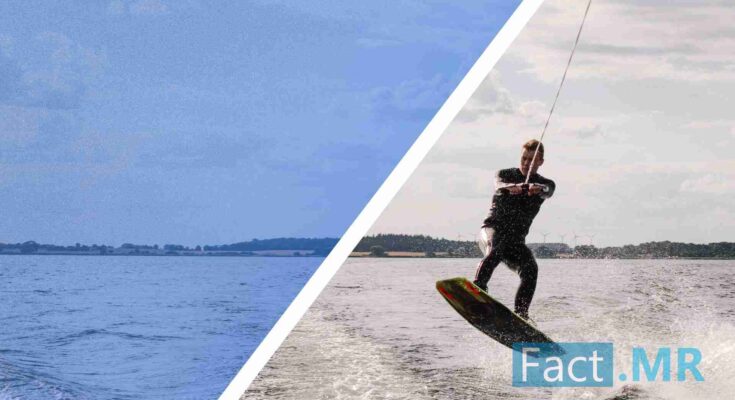Wakeboarding, once a niche water sport, has gained significant popularity in recent years. With its unique blend of adrenaline-pumping action and graceful maneuvers, wakeboarding has captured the attention of water sports enthusiasts around the world. In this article, we focus on the reasons behind the growing demand for wakeboarding and explore the factors driving its rise in popularity.
1. Thrilling and Versatile Water Sport:
Wakeboarding offers a thrilling and versatile experience for individuals seeking adventure on the water. Combining elements of water skiing, snowboarding, and surfing, wakeboarding provides a unique and exhilarating experience that appeals to both beginners and seasoned athletes. Whether you’re gliding across calm waters or catching air off a wake, wakeboarding offers endless opportunities for excitement and progression.
2. Accessibility and Ease of Learning:
Unlike some water sports that require extensive training or specialized skills, wakeboarding is relatively easy to learn. With the availability of professional instructors and beginner-friendly equipment, individuals of all ages and skill levels can quickly grasp the basics and start enjoying the sport. This accessibility has contributed to the growing demand for wakeboarding, attracting a broader audience seeking outdoor recreation and new experiences.
3. Community and Camaraderie:
Wakeboarding has cultivated a vibrant community of enthusiasts who share a passion for the sport. From local wakeboarding clubs to international competitions, this community offers a sense of camaraderie and support. Social media platforms and online forums have further connected wakeboarding enthusiasts, allowing them to share tips, tricks, and experiences. The strong sense of community surrounding wakeboarding has fostered a welcoming environment that encourages new participants to join in and experience the thrill for themselves.
4. Expanding Infrastructure:
The increasing demand for wakeboarding has driven the development of wake parks and cable systems worldwide. Wake parks are purpose-built facilities with cable systems that tow wakeboarders around a circuit, eliminating the need for a boat. This infrastructure expansion has made wakeboarding more accessible in landlocked areas, attracting individuals who previously had limited access to water sports. The convenience and affordability of wake parks have contributed significantly to the sport’s growth.
5. Health and Fitness Benefits:
Wakeboarding offers numerous health and fitness benefits, making it an attractive activity for those seeking an active lifestyle. The sport engages multiple muscle groups, improving strength, balance, and coordination. Additionally, wakeboarding provides a cardiovascular workout, promoting endurance and overall fitness. With the increasing focus on health and wellness, wakeboarding has emerged as a fun and engaging way to stay active and enjoy the outdoors.
Is Wakeboarding Considered a Sport?
Key Trends in the Wakeboarding Industry
The wakeboarding industry is constantly evolving, and several trends have emerged in recent years. Here are some key trends in the wakeboarding industry:
1. Technology Integration: Technology has made its way into the wakeboarding industry, enhancing the overall experience for riders. Advanced wakeboard designs, such as 3D-printed and carbon fiber boards, offer improved performance and durability. Additionally, wakeboarding accessories, such as wearable devices and smartphone apps, provide real-time data on speed, jump height, and other metrics, allowing riders to track their progress and analyze their performance.
2. Cable Wake Parks: Cable wake parks have gained significant popularity in recent years. These purpose-built facilities use an overhead cable system to tow wakeboarders around a circuit, eliminating the need for a boat. Cable parks offer a cost-effective and environmentally friendly alternative to traditional boat-based wakeboarding, making the sport more accessible to a wider audience.
3. Wakesurfing: Wakesurfing, a variation of wakeboarding, has experienced a surge in popularity. Wakesurfing involves riding the wake generated by a boat without being towed, allowing riders to surf the wake using a smaller, specialized wakesurf board. This trend has attracted those looking for a more relaxed and laid-back water sport experience.
4. Eco-Friendly Initiatives: With a growing emphasis on sustainability and eco-consciousness, the wakeboarding industry has seen an increase in eco-friendly initiatives. Wake parks and boat manufacturers are implementing measures to reduce their environmental impact, such as using electric boats or biofuel-powered engines, adopting sustainable construction practices, and promoting water conservation.
5. Inclusivity and Diversity: The wakeboarding community is becoming more inclusive and diverse, with efforts made to encourage participation from people of all backgrounds and abilities. Organizations and events are actively promoting gender equality and providing opportunities for adaptive wakeboarding, allowing individuals with disabilities to experience the sport.
6. Collaborations and Brand Partnerships: Wakeboarding brands are increasingly collaborating with other industries, such as fashion, music, and art, to create unique and eye-catching designs. These collaborations help to expand the reach of wakeboarding beyond the traditional water sports market, attracting new audiences and creating a distinct brand identity.
7. Social Media and Online Community: Social media platforms have played a significant role in promoting and growing the wakeboarding industry. Riders and brands utilize platforms like Instagram, YouTube, and TikTok to share videos, tutorials, and behind-the-scenes content, connecting with fans and building a strong online community.
These trends reflect the evolving nature of the wakeboarding industry, as it continues to innovate and adapt to meet the changing demands and preferences of riders worldwide.
Conclusion
As the demand for unique and thrilling water sports continues to grow, wakeboarding has emerged as a popular choice for individuals seeking adventure and excitement on the water. Its accessibility, versatility, and strong community have contributed to its rise in popularity. With the expanding infrastructure and increasing recognition of its health benefits, demand for wakeboarding is set to continue riding the wave of success in the years to come. So, grab your board, put on your wakeboarding gear, and get ready to experience the thrill of riding the wake!
Also read: Next Frontier of Technology: Understanding the Wonders of Brain-Computer Interface



